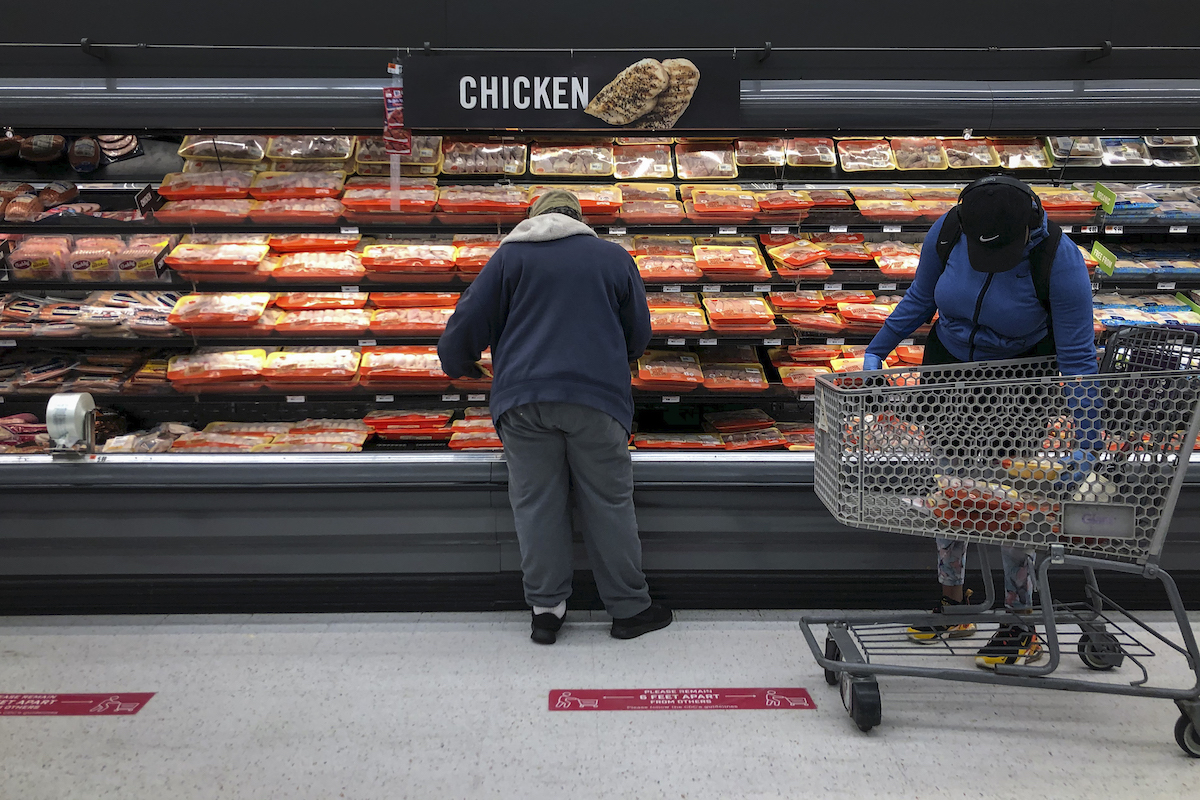RELATED: Never Put This on Your Meat After Barbecuing, CDC Warns. There could not have been a worse time for Tyson Foods Inc. to announce they’re recalling approximately 8,492,832 pounds of ready-to-eat chicken products than July 3, in the midst of the holiday weekend. According to the Food Safety and Inspection Service (FSIS), a department of the United States Department of Agriculture (USDA), the chicken may be adulterated with Listeria monocytogenes. As a result of multiple illnesses, including one death, the CDC deemed it an outbreak and says right now, you should “take extra precautions when eating or serving precooked chicken.” The recall is particularly concerning because many people use precooked chicken to make dishes like chicken salad, a common dish at summer barbecues. “Pre-cooked chicken tends to be in chicken salads or salads with chicken such as the kind that you may find at salad bars,” Bruce Y. Lee, MD, wrote for Forbes. “Unless you can re-heat the pre-cooked chicken to an internal temperature high enough to kill Listeria (at least 165 degrees Fahrenheit), it’s a good idea to avoid any dishes with such chicken for now.” RELATED: 85 Percent of People Are Making This Dangerous Barbecue Mistake, USDA Says. The CDC is advising people not to eat, sell, or serve any of the 30 recalled chicken products, all of which are identified on the FSIS website. The list includes a wide range of fully cooked chicken products, such as chicken strips, chicken wings, and diced chicken that were sold under numerous brands, including Tyson, Jet’s Pizza, Casey’s General Store, Marco’s Pizza, and Little Caesars. All products subject to the Tyson chicken recall bear establishment number “EST. P-7089” on the bag or inside the USDA mark of inspection. According to the notice on the FSIS website, the products have been shipped nationwide to retailers as well as hospitals, nursing facilities, restaurants, schools, and Department of Defense locations. Not only should you not eat or serve any of the recalled chicken products, but the CDC says you should “throw them away” or return them to the place of purchase and then clean your fridge. “Listeria can survive in the refrigerator and can easily spread to other foods and surfaces,” the agency notes. In the average healthy person, Listeria is most likely to cause common food poisoning symptoms, like diarrhea and fever—in which case, people usually recover without treatment, the CDC says. But Listeria can cause a severe illness called listeriosis “when the bacteria spreads beyond the gut to other parts of the body,” the agency explains.ae0fcc31ae342fd3a1346ebb1f342fcb People who are pregnant, over 65, and who have weakened immune systems are at a higher risk for listeriosis. The CDC warns that symptoms of listeriosis usually start a week to four weeks after eating food contaminated with Listeria, but they can take as long as 10 weeks to show up. In people who are not pregnant, the CDC says symptoms include “headache, stiff neck, confusion, loss of balance, and convulsions,” on top of the fever and muscle aches the average person may encounter. Unfortunately, pregnant people with listeriosis usually only experience fever, fatigue, and muscle aches, the CDC says. These symptoms are easy to ignore, but are particularly important to pay attention to because Listeria can cause pregnancy loss or premature birth, and can also lead to serious illness or even death in newborns. According to the CDC, out of an estimated 1,600 people who get sick from Listeria each year, approximately 260 die. FSIS says: “Persons in the higher-risk categories who experience flu-like symptoms within two months after eating contaminated food should seek medical care and tell the health care provider about eating the contaminated food.” RELATED: For more up-to-date information, sign up for our daily newsletter. The CDC is cautioning long-term care facilities and hospitals that serve people at higher risk listeriosis to take extra precautions. Of the three reported illnesses thus far, “all of the sick people in this outbreak ate foods served at a long-term care facility or hospital,” the CDC says. An investigation conducted by the CDC, FSIS, and state public health partners “identified three listeriosis illnesses, including one death, between April 6, 2021 and June 5, 2021. During routine sample collection, FSIS collected two precooked chicken samples from two establishments that are closely related genetically to Listeria monocytogenes from ill people.” The agency is continuing to work with federal and state public health officials to determine if there are additional cases of listeriosis linked to these products. All three illnesses as of July 3 were in Delaware in Texas. RELATED: The FDA Is Pulling All Food Made by This Company From Shelves.



